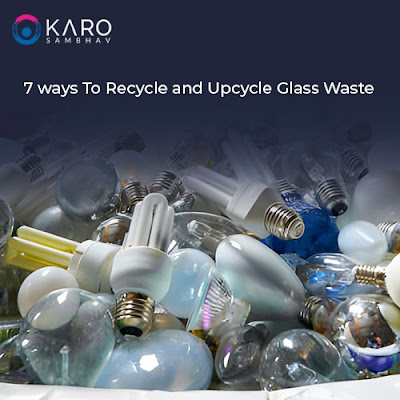7 Ways To Recycle and Upcycle Glass Waste
1. Glass Recycling Bins: By putting in designated glass recycling bins, you may promote the separation of glass waste at the source. Glass can now be easily disposed of separately from other recyclables thanks to these containers, which guarantees a more effective and clean recycling procedure.
2. Glass Bottle Art: Convert used glass bottles into creative artwork. Glass bottles can be used to create one-of-a-kind artwork, sculptures, or ornamental objects by local artists or community members. This enhances the visual appeal and fosters a feeling of communal involvement.
3. Landscaping with Crushed Glass: Crushed glass can be used in place of more conventional materials like pebbles or gravel. It gives roads, garden borders, and pathways a unique touch. Furthermore, shattered glass is strong, doesn't break down, and reflects sunlight to provide a visually pleasing landscape.
4. Glass Mulch in Gardens: Ground glass can be used to mulch gardens sustainably. Glass mulch, when treated correctly, retains soil moisture, inhibits the growth of weeds, and offers insulation. It provides a distinct aesthetic touch to gardens and is an environmentally beneficial substitute for conventional mulches.
5. Do-it-yourself (DIY) Glass Bottle Crafts: Take up glass bottle DIY projects. The choices are boundless, ranging from making lanterns and candle holders to constructing planters and vases. Handmade glass bottle crafts allow for creativity and self-expression in addition to recycling garbage.
6. Glass Recycling Centres: Give your support to nearby glass recycling facilities that gather and handle glass debris ethically. These facilities make sure that glass is cleaned, sorted, and processed into recyclable materials by accepted recycling procedures. By assisting these facilities, glass waste's negative environmental effects are mitigated and circular economy is strengthened.
7. Glass Countertops and Tiles: Recycled glass can be used to make countertops and tiles as part of a larger-scale upcycling project. A visually beautiful and environmentally friendly surface choice for kitchens and bathrooms is recycled glass countertops. Glass is frequently used in conjunction with other materials to produce strong and eye-catching architectural components.
To sum everything up, managing
glass waste necessitates a group effort to implement responsible recycling techniques. Discovering
creative ways to recycle and upcycle glass waste at the individual and
community levels helps to create a future that is more sustainable and green.
By adopting these innovative strategies, we can not only solve the problems
posed by glass waste but also realise its full potential as a useful resource
for a range of purposes.



Comments
Post a Comment